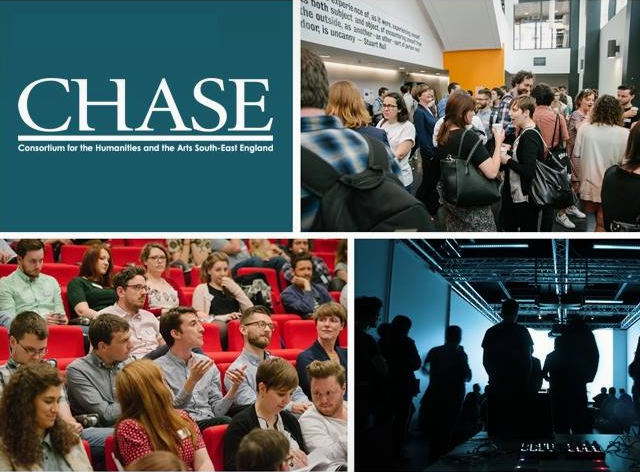CHASE brings together 9 leading institutions engaged in collaborative research activities including an AHRC doctoral training partnership, supporting discipline-based projects, specialising in interdisciplinary research, and research in emerging fields of study and creative practice.
It is central to the ethos at CHASE that serious disciplinary research is interdisciplinary. The following training opportunities are available to research students:
The Future of Arts Research
This programme of innovative skills training is geared toward those involved in practice research, generally, and arts research, specifically. The nature of the training is inherently interdisciplinary, devised and developed by researchers across Fine Art, Performance and Poetry. The training will be suitable and beneficial to researchers at any stage of their project’s development and, while specifically relevant to artist researchers, will be open to researchers in any field.
There are four skills workshops, each dedicated to a key element of practice research. The workshops are scheduled on the following two days:
Workshops 1 & 2: Wednesday, 14 November 2018 @ 11.00 – 18.00
Workshops 3 & 4: Wednesday, 27 February 2019 @ 11.00 – 18.00
All of the workshops will be held at Goldsmiths College.
Participants may sign up for individual workshops, or may choose to attend the entire series.
Details of the workshops and how to sign up are here
Peer Coaching taster session (collaborative with WRoCAH DTP)
25 January 2019 | 11:00 – 16:00
London Venue TBC
Would you benefit from being part of a supportive peer group of WRoCAH doctoral researchers for a whole academic year and beyond?
Peer coaching groups that meet regularly are known as ‘action learning sets’. Groups are intended to offer mutual support and coaching. For each meeting group members are invited bring their current challenges and the group works with them to coach them towards potential solutions.
Taking part in this workshop will give you the chance to work with a group of peers to develop your coaching skills to improve collaborative working, communication and professional relationships. The skills of coaching can be applied to help you get the best out of yourself and the best out of others. This can be in your research, in your teaching or in working with or supervising of others.
Find out more and register here
MARs Session: Radiological Deep Time (by Mountain of Art Research – Goldsmiths)
Various dates, please see below
MARs Research Hub, Seminar Space (Room 5), 43 Lewisham Way London SE14 6NP
This MARs Session will investigate theoretical ideas and artistic practices concerned with radiological deep time. From nuclear landscapes of mining, test sites, and waste storage sites. The session will focus on the problems of decolonising the nuclear, through feminist and forensic analysis, rethinking nuclear landscapes at home, and the mythologies of distant test and mining sites.
Research Student Prep Session Two – 2 Nov, 3-5pm
Research Student Prep Session Three – 23 Nov, 3-5pm
MAIN SESSION / Nuclear Culture Research Symposium: 30 Nov, 10.30am – 6pm & 1 Dec, 10.30am – 2.30pm
Find out more and register here
Early Modern Matters: Materiality and the Archive & Call for papers
11-12 May 2019
University of East Anglia
From the creation of almanacs, gazettes, and paperbooks – whose ephemeral life span led to their repurposing in manifold ways – to the circulation of sermon collections, commonplace books, and annotated printed volumes, the materiality of the early modern world is unavoidable. By studying archival material texts, not only as vessels for words, but as objects created and put to use in everyday life, we can shed light both on the ‘text’ itself – written, drawn, or otherwise – and on the culture in which it was embedded.
The ‘Early Modern Matters: Materiality and the Archive’ conference will bring together scholars of all whose research intersects with the material textual culture of the early modern period (c. 1500-1700). These disciplines include, but are not limited to: the history of the book, art history, literature, the history of medicine, the history of science, and the history of law. By drawing together these strands of early modern scholarship we hope to expand our understanding of how early modern people interacted with texts as physical objects.
Read full call for papers and register here
City Maps – few places left on the Tuesday 21 November session
Birkbeck, Bloomsbury campus
Researching screen media and global cities.
In this workshop, Johan Anderson from King’s College London will lead a workshop with Lawrence Webb (University of Sussex), building on themes introduced in their co-edited books Global Cinematic Cities: New Landscapes of Film and Media (2016) and The City in American Cinema: Film and Postindustrial Culture (forthcoming, 2019). This will comprise a film screening and a workshop at the Birkbeck Cinema. In the workshop session, Andersson and Webb will lead a discussion on the challenges of researching cinema/screen media and cities at a time when both have become destabilized as objects of study. Students will be encouraged to draw on their own PhD projects to consider a range of research methodologies and theoretical approaches to screen media and cities. Johan Andersson and Lawrence Webb will present on their own recent research projects and talk about the challenges of interdisciplinary research and publication. Topics will vary depending on the doctoral students participating, but are likely to include: film, media and the digital turn; gentrification; landscape theory; genre; queer studies; urban history; archival research; location shooting; and urban institutions. Doctoral students working on any urban/national context or historical period are welcome to attend.

